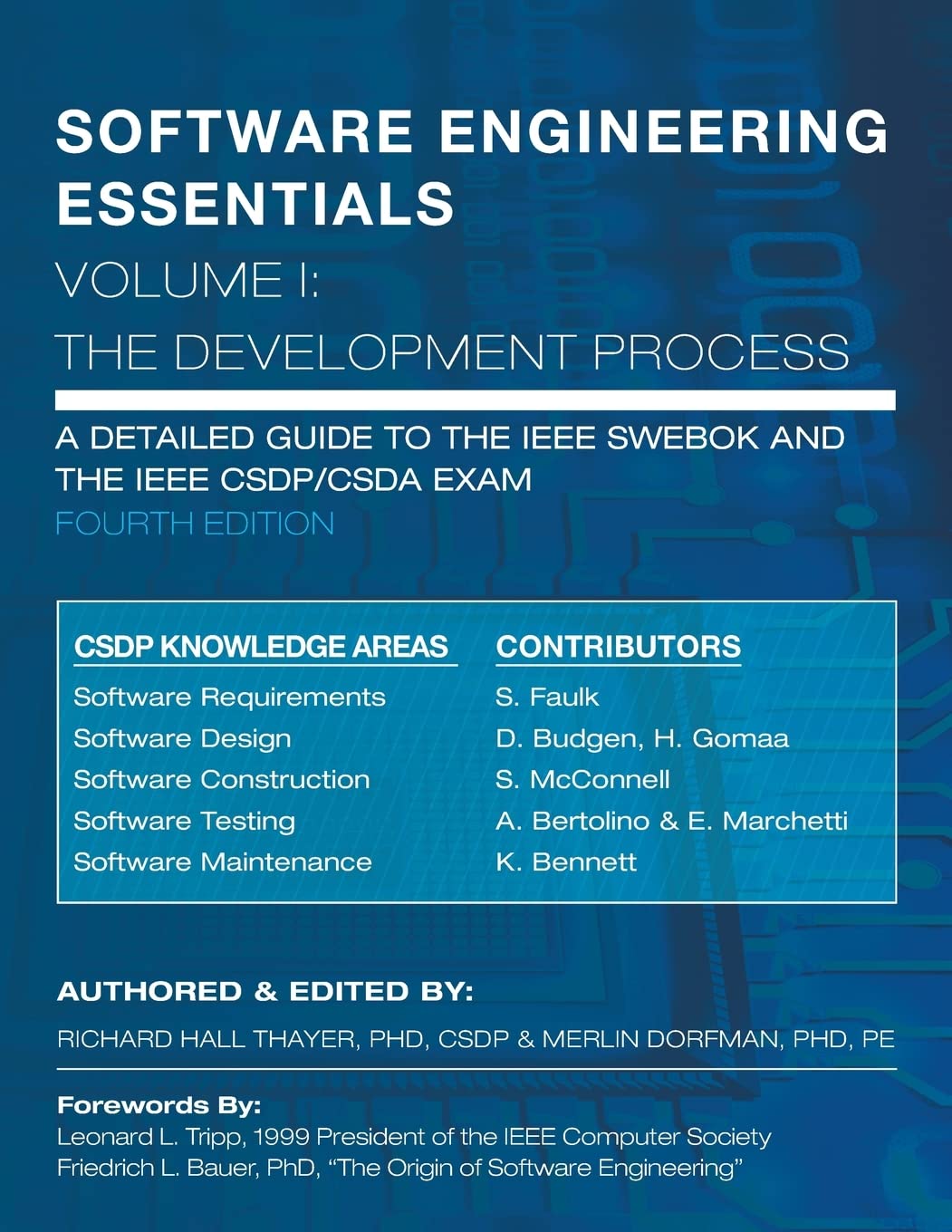

Full description not available
P**T
Excellent material. Passed the CSDP exam!
All three volumes are a must have for anyone in software development or pursuing the CSDA or CSDP certification.They are well written, well organized, and thorough. I passed the CSDP exam on my first attempt after studying basically just these three volumes. I researched some topics of interest to me more thoroughly from various free on-line resources but I don't think it was necessary to pass the exam. I continue to use the volumes frequently as a reference. The material is having a very positive effect on my job and career. Thank you Dr. Thayer, Dr. Dorfman, the IEEE, and all of the contributors to Software Engineering Essentials.
A**R
Must have reference material for professional software developers
As both a software practitioner and an instructor for professional software development, I have found it very difficult to find a single reference that covers the full spectrum of software engineering. I have had to cobble together a collection of publications. This three-volume collection goes a long way to filling this gap. As I review each volume, I see many of the papers that I have used professionally and in my classes, as well as many of the respected authors in the software engineering profession.I like the way that the series covers the breadth of the topics in software engineering contained in the IEEE SWEBOK (Software Engineering Body of Knowledge). The SWEBOK is recognized as one of the best comprehensive compilation of “must know” areas that comprise the professional practice of software engineering. So many times students come out of school thinking that coding is all there is to software engineering. This series helps to grounding them in reality.I also like the way each volume builds from the most basic software topics in Volume I (requirements, design, construction, testing, and maintenance), to the must-do practices in the field in Volume II (configuration management, engineering management, software process, methods, quality), to sophisticated topics in Volume III (software measurements and economics) as well as more academic perspectives (computing, engineering and mathematical foundations). This order reflects the way most software engineers mature in their understanding of the software profession.In summary I would rate this series very highly and recommend it to any individual seeking to have an end-to-end perspective on professional software development. Also each individual volume would be a good textbook for an appropriate graduate or advanced undergraduate course on software engineering.
P**E
Essential reference material
As a professor of software engineering I have access to all the necessary books and papers needed to prepare for the CSDP examination. But I still had to track them all down and organize them for study before I took the test. Fortunately for everyone else, Thayer and Dorfman have done all that work. In fact, if this three volume set was available when I took the exam, I would have bought it in a heartbeat.There is no need for me to recite the scope of the books - these are clearly described in the table of contents - but it is important to note that they span the scope of the CSDP/CSDA exams, which align with the Software Engineering Body of Knowledge (SWEBOK).In my opinion, this set of books is the definitive "one stop shop" to prepare for the CSDA and CSDP examinations. Clearly written, and comprehensive, all three volumes include contributions from leading experts in modern software engineering.In addition to being an essential CSDP/CSDA study guide, the three volumes comprise an excellent reference set for software engineering students and professionals.So, if you are studying for the CSDP/CSDA exam, are a software engineering student, or are software professional, I recommend that you buy all three volumes of the set. In fact, I wish that Amazon would make all three available as a discounted bundled set.
M**S
Both a study guide and solid reference material
This Software Engineering Essentials study guide will be of particular interest to you if you are a software engineering professional interested in IEEE certification. This guide, presented in three volumes, thoroughly covers all 15 Knowledge Areas (KAs) defined in the IEEE software engineering standards. These 15 Knowledge Areas comprise the material covered in the CSDP (Certified Software Development Professional) and CSDA (Certified Software Development Associate) certification examinations. Both authors are experts in the software engineering field and the IEEE software engineering standard.The study guide provides a chapter for each of the Knowledge Areas. Each chapter first presents one or more technical papers published by experts in that particular area. A comprehensive analysis of the exam specification and related material for the Knowledge Area is next presented in a straightforward and easy to understand manner.This study guide is thorough and covers all you need to know for the IEEE examinations. Moreover, it also would serve as an excellent study guide for new software engineers eager to absorb all aspects of software engineering in preparation for a successful career. I strongly recommend this set of three volumes to any software professional, both as a study guide for the IEEE examinations and as a very useful reference guide to be used for years.
Trustpilot
1 week ago
2 months ago